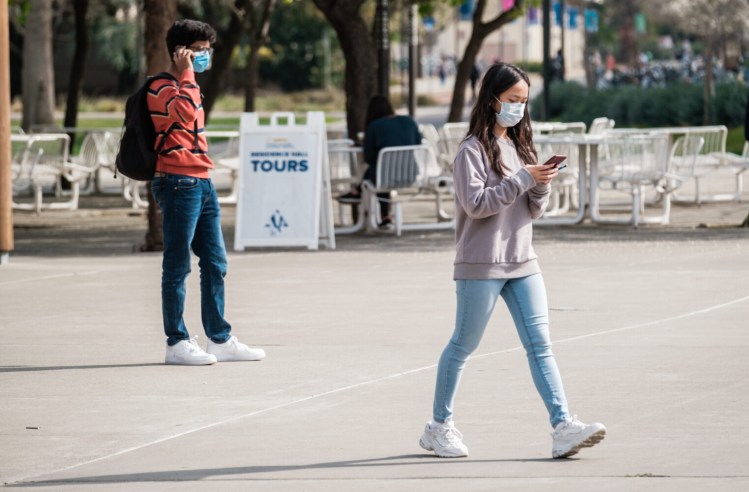A university in California is hoping a cash incentive will keep students from traveling for spring break, the latest effort by a school to curb the spread of the coronavirus as experts urge against travel.
The University of California at Davis is offering $75 “staycation” grants for students staying in town for spring break in late March. Students must apply for the grants by Wednesday evening, and 2,000 students will be selected to receive a gift card to a local business. The school had a total of more than 39,000 students in fall 2019.
It has been about a year since the virus first threw a wrench into academic calendars across the country, prompting schools to shut students out of the classroom or send them away from campus. Some colleges have scaled back or scrapped spring break altogether as students, most of whom may still be waiting for a vaccine, consider what the rest of the school year will look like.
UC Davis is nearing the end of its fourth quarter with nearly all remote instruction.
“I think there’s a lot of COVID fatigue and as all of us are, students are interested in being able to do things and go outside, engage with their peers,” said Sheri Atkinson, the university’s associate vice chancellor for student life. “We are in this place where there is a light at the end of the tunnel, but we’re not quite there yet.”
She said the school recognized that if administrators continued to “ask them to engage in COVID-safe behavior,” the grants were one way to support students.
The school, which has offered similar grants before, initially planned to give them to 750 students but increased that number to 2,000 after seeing a huge response, Atkinson said.
“If we could reach out to any number to be able to help impact their behavior, that is good,” she told The Washington Post. “The more, the better, and the more effective it will be in preventing the spread of covid.”
Jacob Herbstman, a junior at UC Davis, said it was a good idea, even if he believes many of the students taking advantage of the grant were already planning to stay put. He applied for one of the grants previously offered by the school.
“Let’s say you were already never going to go anywhere, and you apply for the grant – it’s not changing your behavior, but at the same time, you may say, ‘I deserve this because I’m doing the right thing,’ ” Herbstman said.
It’s a good idea for universities to continue to encourage students to limit travel and other activities that could lead to the spread of the virus, said Justin Lessler, an infectious-disease expert at the Johns Hopkins Bloomberg School of Public Health.
“College-aged people are mostly unvaccinated – almost universally unvaccinated right now – and the levels of the virus are still quite high,” Lessler said. “Traveling and going home has a potential to both spread the virus from wherever the school is to other places. People can also be infected and bring it back. And the real concern is higher-risk folks could get infected.”
He said that as vaccinations ramp up, “we’re not really that far off from a point where most people who want a vaccine can have a vaccine. In that context, a case delayed is a case permanently prevented.”
As a result, any infection-control measures are more clearly useful, Lessler said.
The Centers for Disease Control and Prevention has urged against spring-break-related travel. Last month, a CDC spokesperson told The Post that the agency “recommends that people not travel at this time, and delay spring break travel until 2022.”
UC Davis offered similar grants ahead of Halloween, an effort to encourage people to participate in virtual activities or activities with their housemates instead of going to large parties.
To qualify for the latest grant, undergraduate or graduate students must be registered as a student, live full time in Davis, stay in Davis for spring break and schedule a coronavirus test during the week of the break.
Herbstman is planning to spend his break at home – which he said is about an hour-and-a-half drive from the school. He said that his parents have been fully vaccinated and that he was able to get his first dose after volunteering with vaccination efforts.
If not for that, he said, he may have considered staying in Davis.
He praised the university for what he called a “robust testing system” and for its overall response to the pandemic.
Throughout the school year, the university has recommended that students get tested at least once a week, if not two or three times, “because we do have the ability to do that,” Atkinson said. The university’s website notes that while travel is “strongly discouraged,” those who choose to travel “are expected to get tested every three to four days during the two-week period” before they leave and after they return.
“It’s all been somewhat of an experiment,” Atkinson said. “How do we influence behavior in ways – in positive ways, not in a punitive way?”
Comments are not available on this story.
Send questions/comments to the editors.


